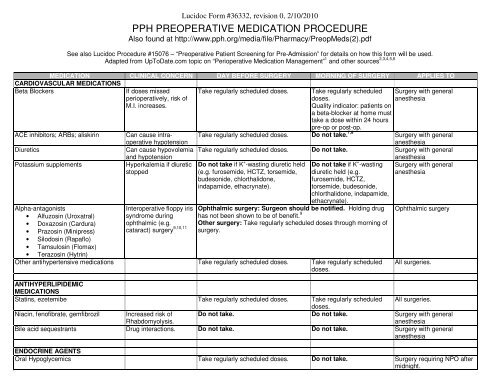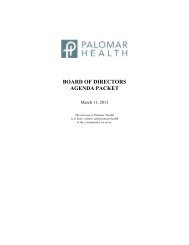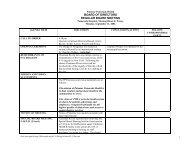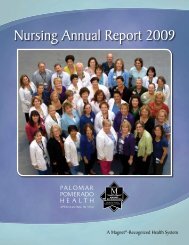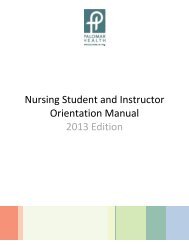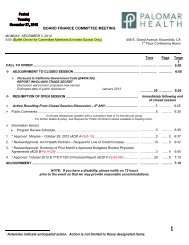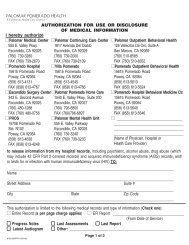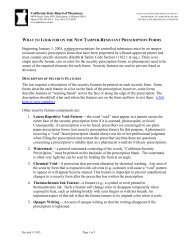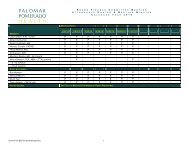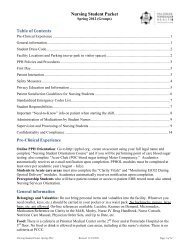PPH PREOPERATIVE MEDICATION PROCEDURE - Palomar Health
PPH PREOPERATIVE MEDICATION PROCEDURE - Palomar Health
PPH PREOPERATIVE MEDICATION PROCEDURE - Palomar Health
Create successful ePaper yourself
Turn your PDF publications into a flip-book with our unique Google optimized e-Paper software.
Lucidoc Form #36332, revision 0, 2/10/2010<br />
<strong>PPH</strong> <strong>PREOPERATIVE</strong> <strong>MEDICATION</strong> <strong>PROCEDURE</strong><br />
Also found at http://www.pph.org/media/file/Pharmacy/PreopMeds(2).pdf<br />
See also Lucidoc Procedure #15076 – “Preoperative Patient Screening for Pre-Admission” for details on how this form will be used.<br />
Adapted from UpToDate.com topic on “Perioperative Medication Management” 1 and other sources 2,3,4,5,6<br />
<strong>MEDICATION</strong> CLINICAL CONCERN DAY BEFORE SURGERY MORNING OF SURGERY APPLIES TO<br />
CARDIOVASCULAR <strong>MEDICATION</strong>S<br />
Beta Blockers If doses missed<br />
perioperatively, risk of<br />
M.I. increases.<br />
Take regularly scheduled doses. Take regularly scheduled<br />
doses.<br />
Quality indicator: patients on<br />
a beta-blocker at home must<br />
take a dose within 24 hours<br />
Surgery with general<br />
anesthesia<br />
ACE inhibitors; ARBs; aliskirin Can cause intra- Take regularly scheduled doses.<br />
pre-op or post-op.<br />
Do not take.<br />
operative hypotension<br />
7,8<br />
Surgery with general<br />
anesthesia<br />
Diuretics Can cause hypovolemia Take regularly scheduled doses. Do not take. Surgery with general<br />
and hypotension<br />
anesthesia<br />
Potassium supplements Hyperkalemia if diuretic Do not take if K<br />
stopped<br />
+ -wasting diuretic held Do not take if K<br />
(e.g. furosemide, HCTZ, torsemide,<br />
budesonide, chlorthalidone,<br />
indapamide, ethacrynate).<br />
+ -wasting Surgery with general<br />
diuretic held (e.g. anesthesia<br />
furosemide, HCTZ,<br />
torsemide, budesonide,<br />
chlorthalidone, indapamide,<br />
ethacrynate).<br />
Alpha-antagonists<br />
• Alfuzosin (Uroxatral)<br />
Interoperative floppy iris<br />
syndrome during<br />
•<br />
•<br />
Doxazosin (Cardura)<br />
Prazosin (Minipress)<br />
ophthalmic (e.g.<br />
cataract) surgery<br />
• Silodosin (Rapaflo)<br />
• Tamsulosin (Flomax)<br />
• Terazosin (Hytrin)<br />
9,10,11<br />
Ophthalmic surgery: Surgeon should be notified. Holding drug<br />
has not been shown to be of benefit. 9<br />
Ophthalmic surgery<br />
Other surgery: Take regularly scheduled doses through morning of<br />
surgery.<br />
Other antihypertensive medications Take regularly scheduled doses. Take regularly scheduled<br />
doses.<br />
All surgeries.<br />
ANTIHYPERLIPIDEMIC<br />
<strong>MEDICATION</strong>S<br />
Statins, ezetemibe Take regularly scheduled doses. Take regularly scheduled<br />
doses.<br />
All surgeries.<br />
Niacin, fenofibrate, gemfibrozil Increased risk of Do not take. Do not take. Surgery with general<br />
Rhabdomyolysis.<br />
anesthesia<br />
Bile acid sequestrants Drug interactions. Do not take. Do not take. Surgery with general<br />
anesthesia<br />
ENDOCRINE AGENTS<br />
Oral Hypoglycemics Take regularly scheduled doses. Do not take. Surgery requiring NPO after<br />
midnight.
Lucidoc Form #36332, revision 0, 2/10/2010<br />
<strong>MEDICATION</strong> CLINICAL CONCERN DAY BEFORE SURGERY MORNING OF SURGERY APPLIES TO<br />
Insulin – Rapid acting Hypoglycemia Take regularly scheduled doses. Do not take. Surgery requiring NPO after<br />
Insulin – Long acting<br />
Including the mixed insulins<br />
(e.g. 70/30, 75/25, or 50/50)<br />
Injectable insulin sensitizer<br />
• Exenatide (Byetta)<br />
• Pramlintide (Symlin)<br />
Glucocorticoids (e.g. prednisone,<br />
hydrocortisone, dexamethasone,<br />
methylprednisolone)<br />
PAIN <strong>MEDICATION</strong>S<br />
Opioids Abrupt withdrawal can<br />
cause yawning,<br />
abdominal cramps,<br />
nausea, vomiting,<br />
diarrhea, insomnia,<br />
midnight.<br />
Hypoglycemia Take regularly scheduled doses. Take ½ of AM dose Surgery requiring NPO after<br />
midnight.<br />
anxiety and salivation.<br />
Tramadol (Ultram) Seizures, drug<br />
interactions<br />
Take regularly scheduled doses. Take regularly scheduled<br />
doses.<br />
Take regularly scheduled doses. Take regularly scheduled<br />
doses.<br />
Take regularly scheduled doses. Take regularly scheduled<br />
doses.<br />
All surgeries.<br />
All surgeries.<br />
All surgeries.<br />
Take regularly scheduled doses. Do not take. Surgery with general<br />
anesthesia
Lucidoc Form #36332, revision 0, 2/10/2010<br />
<strong>MEDICATION</strong> CLINICAL CONCERN DAY BEFORE SURGERY MORNING OF SURGERY APPLIES TO<br />
NSAIDs<br />
Bleeding Hold for at least 3 half lives prior to surgery.<br />
*Note:<br />
Short acting NSAIDs like ibuprofen<br />
may be safely given up through the<br />
night before surgery.<br />
The following NSAIDs have limited to<br />
no antiplatelet effects and do not need<br />
to be held prior to surgery.<br />
• Etodolac (Lodine)<br />
• Meloxicam (Mobic)<br />
• Nabumetone (Relafen)<br />
12,13<br />
Surgeon may allow NSAID use up through morning of surgery. If<br />
Inpatient surgery<br />
surgeon has not advised the patient to continue taking the<br />
medication, then proceed to the following:<br />
• If surgery is planned to take place before the minimum time to<br />
hold, the surgeon should be notified and the patient should be<br />
advised to stop taking the drug.<br />
• If patient reports that holding the medication will be problematic,<br />
the surgeon should be called for alternative pain management.<br />
Alternatives include either a short acting NSAID (e.g. ibuprofen)<br />
or an NSAID with limited to no platelet activity (see first column on<br />
left).<br />
NSAID Brand name Half-life Hold for at least<br />
(hours)<br />
Diclofenac Voltaren, Cataflam 2 Morning of<br />
Diclofenac XR Voltaren XR n/a Day before and of<br />
Etodolac* Lodine 7.3 Don’t hold<br />
Fenoprofen Nalfon 3 Morning of<br />
Flurbiprofen Ansaid 5.7 17 hours<br />
Ibuprofen Advil, Motrin 2 Morning of<br />
Indomethacin Indocin 4.5 14 hours<br />
Ketoprofen 2.1 Morning of<br />
Ketoprofen ER 5.4 16 hours<br />
Ketorolac Toradol 6 18 hours<br />
Meclofenamate 1.3 Morning of<br />
Mefenamic acid Ponstel 2 Morning of<br />
Meloxicam* Mobic 20 Don’t hold<br />
Nambumetone* Relafen 22.5 Don’t hold<br />
Naproxen Naprosyn, Anaprox 17 2 days preop<br />
Oxaprozin Daypro 50 3 weeks preop<br />
Piroxicam Feldene 50 3 weeks preop<br />
Sulindac Clinoril 7.8 24 hours<br />
Tolmetin 7 21 hours<br />
Celecoxib (Celebrex) Take regularly scheduled doses. Take regularly scheduled<br />
doses.<br />
NEUROLOGIC <strong>MEDICATION</strong>S<br />
Benzodiazepines Abrupt withdrawal can<br />
result in agitation, HTN,<br />
delirium and seizures.<br />
Take regularly scheduled doses. Take regularly scheduled<br />
doses.<br />
All surgeries.<br />
All surgeries.
Lucidoc Form #36332, revision 0, 2/10/2010<br />
<strong>MEDICATION</strong> CLINICAL CONCERN DAY BEFORE SURGERY MORNING OF SURGERY APPLIES TO<br />
Lithium (Lithobid) Take regularly scheduled doses. Take regularly scheduled<br />
doses. Close monitoring of<br />
volume and electrolyte<br />
status.<br />
Preop BMP required within<br />
30 days.<br />
Inpatient surgery<br />
Levodopa/Carbidopa (Sinemet) Can cause arrhythmias, Take regularly scheduled doses. Do not take. Surgery with general<br />
hypotension,<br />
hypertension<br />
anesthesia<br />
Dopamine agonists<br />
Can cause arrhythmias, Take AM dose, but not evening dose Do not take. Surgery with general<br />
• Apomorphine (Apokyn)<br />
hypotension<br />
anesthesia<br />
• Pramipexole (Mirapex)<br />
• Ropinerole (Requip)<br />
Monamine Oxidase Inhibitors (MAOI’s) Drug interactions with Take through morning of surgery. Anesthesiologist must be All surgeries.<br />
• Isocarboxazid (Marplan) anesthesia medications informed of the need to use MAOI safe anesthesia or to<br />
• Phenelzine (Nardil)<br />
can result in severe discontinue the medication for 2 weeks prior to surgery.<br />
• Tranylcypromine (Parnate) hypertension or<br />
Agents with mild MAOI effects serotonin syndrome MAOI safe anesthesia = avoid ephedrine, meperidine, and<br />
• Selegeline (Eldepryl oral or<br />
Emsam patch)<br />
dextromethorphan. Phenylephrine is OK.<br />
• Rasagiline (Azilect)<br />
• Linezolid (Zyvox) - antibiotic<br />
Pyridostigmine (Mestinon) Muscarinic side effects Take regularly scheduled doses. Take regularly scheduled Inpatient surgery<br />
Preadmission RN to leave note on doses.<br />
chart to remind surgeon to resume Restart when<br />
ASAP post-op and consult hemodynamically stable.<br />
neurologist if oral doses will not be Parenteral substitutions are<br />
feasible post-op.<br />
available. For IM substitution<br />
give 1/10th the usual oral<br />
dose and for IV substitution<br />
give 1/30th the usual dose.<br />
RHEUMATOLOGIC AGENTS<br />
Probenecid Probenecid interacts with Take regularly scheduled doses.<br />
numerous perioperative<br />
medications.<br />
Do not take. Inpatient surgery<br />
HERBALS<br />
Ginko, Garlic, or Ginseng 14,15<br />
Ephedra tachycardia<br />
and hypertension, MI,<br />
stroke, hemodynamic<br />
instability, and drug-drug<br />
interactions with some<br />
psychiatric<br />
medications<br />
Bleeding May take regularly scheduled doses. Do not take. Inpatient surgery<br />
Do not take on day before surgery. Do not take. Surgery with general<br />
anesthesia
Lucidoc Form #36332, revision 0, 2/10/2010<br />
<strong>MEDICATION</strong> CLINICAL CONCERN DAY BEFORE SURGERY MORNING OF SURGERY APPLIES TO<br />
Kava sedation and potentiation<br />
of anesthetic<br />
medications, and its use<br />
is associated with<br />
concerns<br />
about withdrawal,<br />
tolerance, and addiction<br />
Saw palmetto (Serenoa repens) Interoperative floppy iris<br />
syndrome during<br />
ophthalmic (e.g.<br />
cataract) surgery 9<br />
Do not take on day before surgery. Do not take. Surgery with general<br />
anesthesia<br />
Ophthalmic surgery: Surgeon should be notified.<br />
Other surgery: Take regularly scheduled doses through day before<br />
surgery.<br />
Ophthalmic surgery<br />
<strong>MEDICATION</strong><br />
ANTIPLATELETS<br />
CLINICAL<br />
CONCERN<br />
BEFORE SURGERY APPLIES TO<br />
Aspirin alone Bleeding Surgeon must decide.<br />
<strong>PPH</strong> guidelines available below. “Platelet function aspirin” test available. Platelet function<br />
should be normal 72 hours after last dose.<br />
Inpatient surgery<br />
Aspirin/Dipyridamole Bleeding Prescriber and surgeon should collaborate to decide whether to give or hold. Inpatient surgery,<br />
extended release<br />
Aspirin: “Platelet function aspirin” test available. Platelet function should be normal 72 Endoscopy,<br />
(Aggrenox)<br />
hours after last dose.<br />
Dipyridamole: Should wear off by about 36-48 hours after last dose. “Platelet function<br />
epinephrine” test may be useful if there is a need to ensure normal platelet function.<br />
Interventional radiology.<br />
Cilostazol (Pletal) Bleeding 16,17,18 Surgeon must decide. Probably mild bleeding potential. Consider stopping for 48h<br />
preop. “Platelet function epinephrine” test may be useful if there is a need to ensure<br />
normal platelet function.<br />
Inpatient surgery<br />
Clopidogrel (Plavix) Bleeding Prescriber and surgeon should collaborate to decide whether to give or hold. Inpatient surgery,<br />
<strong>PPH</strong> guidelines are available below. If drug held, guidelines recommend holding for 5-10 Endoscopy,<br />
days. Full platelet recovery will occur in 3 days for 50% of patients, and in 5 days for 80%<br />
of patients. Full recovery will take longer than 5 days in 20% of patients.<br />
P2Y12 platelet testing is advised if there is a need to ensure normal platelet function.<br />
Interventional radiology.<br />
Dipyridamole (Persantine) Bleeding Surgeon must decide.<br />
Should wear off by about 36 hours after last dose. “Platelet function epinephrine” test may<br />
be useful if there is a need to ensure normal platelet function.<br />
Inpatient surgery<br />
Ticlopidine (Ticlid) Bleeding Prescriber and surgeon should collaborate to decide whether to give or hold. Inpatient surgery,<br />
<strong>PPH</strong> guidelines are available below for clopidogrel, but ticlopidine has a much longer half- Endoscopy,<br />
life. Full recovery of platelets may take 11-13 days on average.<br />
P2Y12 platelet testing is advised if there is a need to ensure normal platelet function.<br />
Interventional radiology.<br />
Prasugrel (Effient) Bleeding Prescriber and surgeon should collaborate to decide whether to give or hold. Inpatient surgery,<br />
<strong>PPH</strong> guidelines are available below. Prasugrel has the same recommendations as CLOP. Endoscopy,<br />
If drug held, guidelines recommend holding for 5-10 days. Full platelet recovery may occur Interventional radiology.<br />
in as early as 3-5 days for some patients, but may take longer than 5 days in other patients.<br />
P2Y12 platelet testing is advised if there is a need to ensure normal platelet function.
Lucidoc Form #36332, revision 0, 2/10/2010
Lucidoc Form #36332, revision 0, 2/10/2010<br />
<strong>MEDICATION</strong> CLINICAL CONCERN BEFORE SURGERY APPLIES TO<br />
ANTICOAGULANTS<br />
Warfarin Bleeding Prescriber and surgeon should collaborate to decide whether to<br />
give or hold.<br />
<strong>PPH</strong> guidelines are available below.<br />
Enoxaparin (Lovenox) Bleeding Surgeon must advise patient on when last dose should be<br />
administered.<br />
<strong>PPH</strong> recommends 12-24h, depending on renal function.<br />
Fondaparinux (Arixtra) Bleeding Surgeon must advise patient on when last dose should be<br />
administered.<br />
<strong>PPH</strong> recommends 24-48h, depending on renal function.<br />
Endo, I.R & All surgeries<br />
except outpatient ophthalmic<br />
and dermatologic surgery.<br />
Endo, I.R & All surgeries<br />
except outpatient ophthalmic<br />
and dermatologic surgery.<br />
Endo, I.R & All surgeries<br />
except outpatient ophthalmic<br />
and dermatologic surgery.
Lucidoc Form #36332, revision 0, 2/10/2010<br />
<strong>MEDICATION</strong> CLINICAL CONCERN BEFORE SURGERY APPLIES TO<br />
ESTROGEN / PROGESTERONE<br />
Oral Contraceptives;<br />
Hormone Replacement Therapy<br />
Selective estrogen receptor modulator<br />
• Raloxifene (Evista)<br />
• Tamoxifen<br />
• Toremifene (Fareston)<br />
Increased risk of VTE. Surgeon must decide. <strong>PPH</strong> Guidelines:<br />
Procedures with low risk of VTE: Take regularly scheduled doses.<br />
Procedures with moderate to high risk of VTE. Consider holding for<br />
4-6 weeks prior to surgery and for two weeks after regaining full<br />
mobility.<br />
Inpatient surgery<br />
Increased risk of VTE. When used for PREVENTION of cancer or treatment of osteoporosis Inpatient surgery<br />
Surgeon must decide. <strong>PPH</strong> Guidelines:<br />
• Procedures with low risk of VTE: Take regularly scheduled doses.<br />
• Procedures with moderate to high risk of VTE. Consider<br />
holding for 4-6 weeks prior to surgery and for two weeks after<br />
regaining full mobility.<br />
When used for TREATMENT of cancer prescriber and surgeon<br />
should collaborate to decide whether to give or hold.
Lucidoc Form #36332, revision 0, 2/10/2010<br />
<strong>MEDICATION</strong> CLINICAL CONCERN BEFORE SURGERY APPLIES TO<br />
SSRI’s, SNRI’s May increase risk of<br />
bleeding<br />
(See section at end of<br />
document for details<br />
from UpToDate.com)<br />
Bleeding risk from SSRIs 1<br />
Spinal or neurosurgical procedures: Surgeon must decide. <strong>PPH</strong><br />
Guidelines are to consider discontinuing therapy 3 weeks prior to<br />
surgery.<br />
Other procedures: Take through morning of procedure<br />
Spinal or neurosurgical<br />
procedures.<br />
SSRIs can decrease intraplatelet serotonin concentrations and this may affect platelet aggregation [23]. Anecdotal reports have indicated a<br />
relationship between SSRI use and mostly minor bleeding complications, including easy bruising, petechiae and purpura, epistaxis and hematomas<br />
[24,25].<br />
Studies have also suggested that selective serotonin reuptake inhibitors (SSRIs) are associated with an increased risk of upper gastrointestinal (UGI)<br />
bleeding, particularly in patients taking NSAIDs. This association was illustrated in two case control trials in which the risk of UGI bleeding was<br />
increased among patients who used SSRIs compared to those without exposure to these drugs (OR 3.0 and 1.6, for the two studies) [26,27]. The risk<br />
was substantially increased in those concurrently taking NSAIDS with SSRIs (OR 15.6 and 4.8), suggesting a potential synergistic effect. Acid<br />
suppressing medications may limit the increased risk [27] (See "NSAIDs (including aspirin): Pathogenesis of gastroduodenal toxicity").<br />
A case control study of patients hospitalized for major bleeding while taking coumarin found that the risk for nongastrointestinal bleeding was<br />
significantly greater in people taking an SSRI (OR 1.7, 95% CI1.1-2.5), but that the risk for gastrointestinal bleeding was not increased [28]. Data on<br />
the intensity of anticoagulation was not available for this study, but it would be reasonable to use extra care in monitoring patients who are<br />
concurrently treated with an SSRI and an anticoagulant,<br />
SSRIs may also increase the need for transfusions with surgery. A retrospective study of 520 patients undergoing orthopedic surgery found that the<br />
risk for transfusion was increased in patients on serotonergic antidepressants (most of which were SSRIs) (OR 3.71, 95% CI 1.35-10.18) but not in<br />
patients on nonserotonergic antidepressants (OR 0.74, 95% CI 0.10-5.95) [29].<br />
REFERENCES FOR SSRI BLEEDING RISK:<br />
37. Li, N, Wallen, NH, Ladjevardi, M, Hjemdahl, P. Effects of serotonin on platelet activation in whole blood. Blood Coagul Fibrinolysis 1997; 8:517.<br />
38. Serebruany, VL. Selective serotonin reuptake inhibitors and increased bleeding risk: are we missing something?. Am J Med 2006; 119:113.<br />
39. Krasowska, D, Szymanek, M, Schwartz, RA, Myslinski, W. Cutaneous effects of the most commonly used antidepressant medication, the selective serotonin reuptake inhibitors. J Am Acad<br />
Dermatol 2007; 56:848.<br />
40. de Abajo, FJ, Garcia Rodriguez, LA, Montero, D. Association between selective serotonin reuptake inhibitors and upper gastrointestinal bleeding: Population-based case-control study. BMJ<br />
1999; 319:1106.<br />
41. de Abajo, FJ, Garcia-Rodriguez, LA. Risk of upper gastrointestinal tract bleeding associated with selective serotonin reuptake inhibitors and venlafaxine therapy: interaction with nonsteroidal<br />
anti-inflammatory drugs and effect of acid-suppressing agents. Arch Gen Psychiatry 2008; 65:795.<br />
42. Schalekamp, T, Klungel, OH, Souverein, PC, de Boer, A. Increased bleeding risk with concurrent use of selective serotonin reuptake inhibitors and coumarins. Arch Intern Med 2008; 168:180.<br />
43. Movig, KL, Janssen, MW, de Waal, Malefijt J, et al. Relationship of serotonergic antidepressants and need for blood transfusion in orthopedic surgical patients. Arch Intern Med 2003; 163:2354.
NOTES:<br />
Endo = Endoscopy<br />
I.R. = Interventional Radiology<br />
Cardiac Cath Lab is not included within the scope of this procedure.<br />
Lucidoc Form #36332, revision 0, 2/10/2010<br />
REFERENCES:<br />
1 Muluk V, Macpherson DS. Perioperative Medication Management. UpToDate.com (v17.2) – last updated May 28, 2009 (accessed 10/8/2009)<br />
2 Kuwajerwala NK, Reddy RC, Kanthimathinathan VS, Siddiqui RA. Perioperative Medication Management. Emedicine.medscape.com updated Aug 19, 2008 (accessed 7/24/2009)<br />
3 Douketis JD, Berger PB, Dunn AS, Jaffer AK, Spyropoulos AC, Becker RC, Ansell J; American College of Chest Physicians. The perioperative management of antithrombotic therapy: American College<br />
of Chest Physicians Evidence-Based Clinical Practice Guidelines (8th Edition). Chest. 2008 Jun;133(6 Suppl):299S-339S.<br />
4 Saber W. Perioperative medication management: a case-based review of general principles. Cleve Clin J Med. 2006 Mar;73 Suppl 1:S82-7.<br />
5 Schwartz A. Should I continue or discontinue that medication? AANA J. 2009 Jun;77(3):170.<br />
6 Howe CR, Gardner GC, Kadel NJ. Perioperative medication management for the patient with rheumatoid arthritis. J Am Acad Orthop Surg. 2006 Sep;14(9):544-51.<br />
7 Schirmer U, Schürmann W. Preoperative administration of angiotensin-converting enzyme inhibitors. Anaesthesist. 2007 Jun;56(6):557-61.<br />
8 Comfere T, Sprung J, Kumar MM, et al. Angiotensin system inhibitors in a general surgical population. Anesth Analg. 2005 Mar;100(3):636-44.<br />
9 Chang DF, Braga-Mele R, Mamalis N, Masket S, Miller KM, Nichamin LD, Packard RB, Packer M; ASCRS Cataract Clinical Committee. ASCRS White Paper: clinical review of intraoperative floppy-iris<br />
syndrome. J Cataract Refract Surg. 2008 Dec;34(12):2153-62.<br />
10 Issa SA, Hadid OH, Baylis O, Dayan M. Alpha antagonists and intraoperative floppy iris syndrome: A spectrum. Clin Ophthalmol. 2008 Dec;2(4):735-41.<br />
11 Neff KD, Sandoval HP, Fernández de Castro LE, Nowacki AS, Vroman DT, Solomon KD. Factors associated with intraoperative floppy iris syndrome. Ophthalmology. 2009 Apr;116(4):658-63.<br />
12 Hong Y, Gengo FM, Rainka MM, Bates VE, Mager DE. Population pharmacodynamic modelling of aspirin- and Ibuprofen-induced inhibition of platelet aggregation in healthy subjects. Clin<br />
Pharmacokinet. 2008;47(2):129-37.<br />
13 Gengo FM, Rubin L, Robson M, et al. Clinical Consequences in Stroke Prophylaxis Effects of Ibuprofen on the Magnitude and Duration of Aspirin's Inhibition of Platelet Aggregation. J. Clin. Pharmacol.<br />
2008; 48; 117<br />
14 Beckert BW, Concannon MJ, Henry SL, Smith DS, Puckett CL. The effect of herbal medicines on platelet function: an in vivo experiment and review of the literature. Plast Reconstr Surg. 2007<br />
Dec;120(7):2044-50<br />
15 Scharbert G, Kalb ML, Duris M, Marschalek C, Kozek-Langenecker SA. Garlic at dietary doses does not impair platelet function. Anesth Analg. 2007 Nov;105(5):1214-8<br />
16 Yasunaga K, Mase K. Antiaggregatory effect of oral cilostazol and recovery of platelet aggregability in patients with cerebrovascular disease. Arzneimittelforschung. 1985;35(7A):1189-92.<br />
17 Kaneda T, Urimoto G, Suzuki T. Spinal epidural hematoma following epidural catheter removal during antiplatelet therapy with cilostazol. J Anesth. 2008;22(3):290-3.<br />
18 Kasanuki H. Guidelines for management of anticoagulant and antiplatelet therapy in cardiovascular disease (JCS2004). Circ J. 2004;68(Suppl IV):1221–1230.


